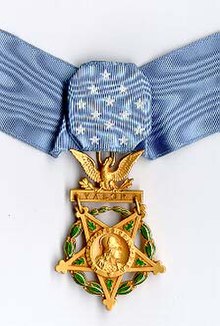
Quick Facts
Biography
Loren Douglas Hagen (February 25, 1946 – August 7, 1971) was a United States Army Special Forces officer and a recipient of the United States military's highest decoration—the Medal of Honor—for his actions during the Vietnam War as Recon Team (RT) leader of a small special reconnaissance unit "RT Kansas", manned by USASF Green Berets and highly trained Montagnard commandos from Task Force One Advisory Element aka Command & Control North, a division of Studies and Observations Group in the Vietnam War.
Biography
Hagen was born in Fargo, North Dakota, son of Loren H. Hagen (1919 - 2002) and Eunice H. Harris Hagen (1921 - 2008). The family lived in Moorhead, Minnesota where he worked summers as a farm laborer and as a lifeguard. He was an Eagle Scout and was credited with saving the life of a swimmer at the Moorhead swimming pool in 1968. He had two brothers: Michael and Jeffrey.
His father was transferred to Decatur, Illinois his sophomore year of high school. He attended MacArthur High School in Decatur where he was student council president and graduated in 1964. After high school he returned to Minnesota and enrolled at North Dakota State University where He received a degree in engineering, industrial science and math. After college he enlisted in the Army. He attended Officer Candidate School at Fort Benning and then was trained at Fort Bragg and became a member of the 5th Special Forces, Green Berets.
Career and Command
Hagen joined the Army from his birth city of Fargo, North Dakota in 1968, and by August 7, 1971 was serving as a first lieutenant in command of special Recon Team (RT) Kansas, a mixed unit of U.S. Army Special Forces and Montagnard commandos from Task Force One Advisory Element (TF1AE), also known as Command & Control North (CCN) with MACV-SOG (name changed in March 1971 to "TAG" Training Advisory Group, U.S. Army).
Facing massed NVA forces
Hagan's special reconnaissance team had landed and secured their position for the overnight mission almost within sight of the Hanoi High Command's most critical new venture of late 1971, the first six-inch fuel pipeline laid across the Vietnamese DMZ, which was essential a few months in the future when entire tank battalions rolled through the area for the Vietnam War's largest offensive. The North Vietnamese Army (NVA) 304th Division was already massing there, plus a regiment of the 308th Division, in preparation for the 1972 Easter Offensive.
Enemy attack
During an enemy attack on August 7, in an assembly area of the North Vietnamese Army in the A Shau Valley of the Republic of Vietnam, Hagen led his small recon team's defense, and when USASF Sgt. Bruce Allen Berg was hit by a rocket in one of the team's bunkers, Hagen crawled towards Berg's position through heavy fire in an attempt to assist Berg, returning fire as he proceeded. Mortally wounded in the process, Hagen was later posthumously awarded the Medal of Honor for his actions. Berg was never found and he was initially listed as Missing in Action, Body Not Recovered. Berg was 21 at the time of his loss. He was later declared Killed in Action, Body Not Recovered (KIA/BNR).
Other members of Recon Team Kansas were: USASF SSG Oran Bingham, USASF SGT William R. "Bill" Queen (DSC awarded for his actions), USASF SGT Bruce Allen Berg, USASF SGT William "Bill" Rimondi, USASF SGT Tony "Fast Eddie" Andersen (?), and eight Bru Degar (Montagnard) Commandos (no names available).
Hagen, aged 25 at his death, was buried in Arlington National Cemetery, Arlington County, Virginia.
Medal of Honor citation

First Lieutenant Hagen's official Medal of Honor citation reads:
1st Lt. Hagen distinguished himself in action while serving as the team leader of a small special reconnaissance team operating deep within enemy-held territory. At approximately 0630 hours on the morning of 7 August 1971 the small team came under a fierce assault by a superior-sized enemy force using heavy small arms, automatic weapons, mortar, and rocket fire. 1st Lt. Hagen immediately began returning small-arms fire upon the attackers and successfully led this team in repelling the first enemy onslaught. He then quickly deployed his men into more strategic defense locations before the enemy struck again in an attempt to overrun and annihilate the beleaguered team's members. 1st Lt. Hagen repeatedly exposed himself to the enemy fire directed at him as he constantly moved about the team's perimeter, directing fire, rallying the members, and resupplying the team with ammunition, while courageously returning small arms and hand grenade fire in a valorous attempt to repel the advancing enemy force. The courageous actions and expert leadership abilities of 1st Lt. Hagen were a great source of inspiration and instilled confidence in the team members. After observing an enemy rocket make a direct hit on and destroy 1 of the team's bunkers, 1st Lt. Hagen moved toward the wrecked bunker in search for team members despite the fact that the enemy force now controlled the bunker area. With total disregard for his own personal safety, he crawled through the enemy fire while returning small-arms fire upon the enemy force. Undaunted by the enemy rockets and grenades impacting all around him, 1st Lt. Hagen desperately advanced upon the destroyed bunker until he was fatally wounded by enemy small arms and automatic weapons fire. With complete disregard for his personal safety, 1st Lt. Hagen's courageous gallantry, extraordinary heroism, and intrepidity above and beyond the call of duty, at the cost of his own life, were in keeping with the highest traditions of the military service and reflect great credit upon him and the U.S. Army.
